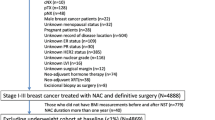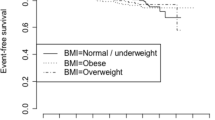Abstract
Background: Obesity has been shown to be an indicator of poor prognosis for patients with primary breast cancer (BC) regardless of the use of adjuvant systemic therapy. Patients and methods: This is a retrospective analysis of 2,887 node-positive BC patients enrolled in the BIG 02-98 adjuvant study, a randomised phase III trial whose primary objective was to evaluate disease-free survival (DFS) by adding docetaxel to doxorubicin-based chemotherapy. In the current analysis, the effect of body mass index (BMI) on DFS and overall survival (OS) was assessed. BMI was obtained before the first cycle of chemotherapy. Obesity was defined as a BMI ≥ 30 kg/m². Results: In total, 547 (19%) patients were obese at baseline, while 2,340 (81%) patients were non-obese. Estimated 5-year OS was 87.5% for non-obese and 82.9% for obese patients (HR 1.34; P = 0.013). Estimated 5-years DFS was 75.9% for non-obese and 70.0% for obese patients (HR 1.20; P = 0.041). In a multivariate model, obesity remained an independent prognostic factor for OS and DFS. Conclusions: In this study, obesity was associated with poorer outcome in node-positive BC patients. Given the increasing prevalence of obesity worldwide, more research on improving the treatment of obese BC patients is needed.


Similar content being viewed by others
References
Ferlay J, Bray F, Pisani P, Parkin DM (2001) Globocan 2000. Cancer incidence, mortality and prevalence worldwide. Version 1.0. IARC CancerBase No. 5. IARCPress, Lyon
Cancer Facts & Figs 2008 (2008) Graphs and figures. (In Edition 2008)
Ferlay J, Autier P, Boniol M et al (2007) Estimates of the cancer incidence and mortality in Europe in 2006. Ann Oncol 18:581–592
World Health Organization (2008) Controlling the global obesity epidemic (In Edition 2008)
U.S. Obesity Trends 1985-2007 (2008) (In Edition 2008)
Caterson ID, Gill TP (2002) Obesity: epidemiology and possible prevention. Best Pract Res Clin Endocrinol Metab 16:595–610
World Health Organization (2008) Global database on body mass index (In Edition 2008)
Dignam JJ, Wieand K, Johnson KA et al (2006) Effects of obesity and race on prognosis in lymph node-negative, estrogen receptor-negative breast cancer. Breast Cancer Res Treat 97:245–254
Vitolins MZ, Kimmick GG, Case LD (2008). BMI influences prognosis following surgery and adjuvant chemotherapy for lymph node positive breast cancer. Breast J 14(4):357–365
Ryu SY, Kim CB, Nam CM et al (2001) Is body mass index the prognostic factor in breast cancer?: a meta-analysis. J Korean Med Sci 16:610–614
Chlebowski RT, Aiello E, McTiernan A (2002) Weight loss in breast cancer patient management. J Clin Oncol 20:1128–1143
Loi S, Milne RL, Friedlander ML et al (2005) Obesity and outcomes in premenopausal and postmenopausal breast cancer. Cancer Epidemiol Biomarkers Prev 14:1686–1691
Colleoni M, Li S, Gelber RD et al (2005) Relation between chemotherapy dose, oestrogen receptor expression, and body-mass index. Lancet 366:1108–1110
Majed B, Moreau T, Senouci K et al (2008) Is obesity an independent prognosis factor in woman breast cancer? Breast Cancer Res Treat 111:329–342
Francis P, Crown J, Di Leo A et al (2008) Adjuvant chemotherapy with sequential or concurrent anthracycline and docetaxel: Breast International Group 02–98 randomized trial. J Natl Cancer Inst 100:121–133
Roche H, Fumoleau P, Spielmann M et al (2006) Sequential adjuvant epirubicin-based and docetaxel chemotherapy for node-positive breast cancer patients: the FNCLCC PACS 01 Trial. J Clin Oncol 24:5664–5671
Martin M, Pienkowski T, Mackey J et al (2005) Adjuvant docetaxel for node-positive breast cancer. N Engl J Med 352:2302–2313
Cox DR (1972) Regression models and life-tables (with discussion). J Royal Stat Sc B 34:187–220
Berclaz G, Li S, Price KN et al (2004) Body mass index as a prognostic feature in operable breast cancer: the International Breast Cancer Study Group experience. Ann Oncol 15:875–884
Greenman CG, Jagielski CH, Griggs JJ (2008) Breast cancer adjuvant chemotherapy dosing in obese patients: dissemination of information from clinical trials to clinical practice. Cancer 112:2159–2165
Litton JK, Gonzalez-Angulo AM, Warneke CL et al (2008) Relationship between obesity and pathologic response to neoadjuvant chemotherapy among women with operable breast cancer. J Clin Oncol 26:4072–4077
Lees AW, Jenkins HJ, May CL et al (1989) Risk factors and 10-year breast cancer survival in northern Alberta. Breast Cancer Res Treat 13:143–151
Hebert JR, Hurley TG, Ma Y (1998) The effect of dietary exposures on recurrence and mortality in early stage breast cancer. Breast Cancer Res Treat 51:17–28
Maehle BO, Tretli S (1996) Pre-morbid body-mass-index in breast cancer: reversed effect on survival in hormone receptor negative patients. Breast Cancer Res Treat 41:123–130
Cust AE, Stocks T, Lukanova A et al (2009) The influence of overweight and insulin resistance on breast cancer risk and tumour stage at diagnosis: a prospective study. Breast Cancer Res Treat 113:567–576
Suzuki R, Orsini N, Saji S et al (2009) Body weight and incidence of breast cancer defined by estrogen and progesterone receptor status-A meta-analysis. Int J Cancer 124:698–712
Dignam JJ, Wieand K, Johnson KA et al (2003) Obesity, tamoxifen use, and outcomes in women with estrogen receptor-positive early-stage breast cancer. J Natl Cancer Inst 95:1467–1476
Meyerhardt JA, Niedzwiecki D, Hollis D et al (2008) Impact of body mass index and weight change after treatment on cancer recurrence and survival in patients with stage III colon cancer: findings from Cancer and Leukemia Group B 89803. J Clin Oncol 26:4109–4115
Meyerhardt JA, Catalano PJ, Haller DG et al (2003) Influence of body mass index on outcomes and treatment-related toxicity in patients with colon carcinoma. Cancer 98:484–495
Dignam JJ, Polite BN, Yothers G et al (2006) Body mass index and outcomes in patients who receive adjuvant chemotherapy for colon cancer. J Natl Cancer Inst 98:1647–1654
Haydon AM, Macinnis RJ, English DR, Giles GG (2006) Effect of physical activity and body size on survival after diagnosis with colorectal cancer. Gut 55:62–67
Acknowledgments
We thank the patients, physicians, nurses and data managers who participated in BIG 02-98 and the staff at the central offices of the cooperative groups. The following cooperative groups participated: Breast European Adjuvant Studies Team, International Breast Cancer Study Group (including Australian New Zealand Breast Cancer Trials Group), Irish Clinical Oncology Research Group, Grupo Español de Investigacion en Cancer de Mama, Danish Breast Cancer Cooperative Group, Swedish Breast Cancer Group, Austrian Breast and Colorectal Cancer Study Group and Grupo Oncologico Cooperative Chileno De Investigacion. The BIG 02-98 trial was supported by the National Health and Medical Research Council (project grants 100925 and 351164 to Australian New Zealand Breast Cancer Trials Group).
Author information
Authors and Affiliations
Corresponding author
Additional information
On behalf of the BIG 02-98 Study Team.
Rights and permissions
About this article
Cite this article
de Azambuja, E., McCaskill-Stevens, W., Francis, P. et al. The effect of body mass index on overall and disease-free survival in node-positive breast cancer patients treated with docetaxel and doxorubicin-containing adjuvant chemotherapy: the experience of the BIG 02-98 trial. Breast Cancer Res Treat 119, 145–153 (2010). https://doi.org/10.1007/s10549-009-0512-0
Received:
Accepted:
Published:
Issue Date:
DOI: https://doi.org/10.1007/s10549-009-0512-0




